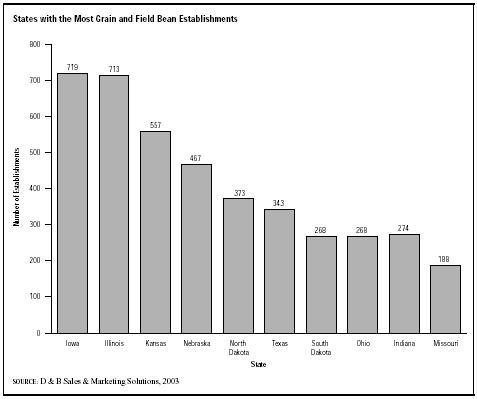SIC 5153
GRAIN AND FIELD BEANS
This industry classification is comprised of establishments engaged in buying and/or marketing grain, dry beans, soybeans, and other inedible beans. Also included are country grain elevators, terminal elevators, and other merchants involved in marketing grain. Establishments primarily involved in the wholesale distribution of field and garden seeds are in SIC 5191: Farm Supplies.
NAICS Code(s)
422510 (Grain and Field Bean Wholesalers)
A total of 6,401 establishments were classified in this industry in 2003. Their combined sales were estimated at $62 million. They employed almost 54,000 workers and posted an annual payroll of $1.8 million. Average number of workers per establishment totaled about nine, and average sales per establishment was approximately $17 million.
Leading states in 2003, as measured by number of establishments and value of sales, were Illinois, Iowa, Kansas, Nebraska, and Minnesota. Two other states with high sales' volume, despite relatively small numbers of establishments, were Louisiana, Missouri, Ohio, and Michigan.
Worldwide, the grain trade peaked in 1979 at 240 million metric tons. During the 1980s and early 1990s, however, both U.S. grain buyers and sellers suffered from market stagnation. Foreign policy decisions led to grain embargoes restricting the ability of U.S. merchants to peddle grains in some overseas markets. In 1992, Fortune reported that approximately half of the country's grain elevator and terminal capacity had been idled.
By the mid-1990s the condition of the industry had improved. The grain market of 1996 was the strongest since the 1970s, according to The Wall Street Journal. The failure of the winter wheat crop left supplies in storage at low levels, and high demand from importers like China pushed corn and wheat prices to record highs that year. The booming prices caused financial disaster, though, for farmers and elevators that had signed hedge-to-arrive contracts. Countrymark Cooperative Inc. of Indiana was embroiled in court cases as a result of these instruments.
The Federal Agricultural Improvement and Reform Act of 1996, or the so-called "freedom to farm" legislation, phased out farm subsidies over a seven-year period. It allowed farmers to grow whatever crops were profitable on the market, rather than restricting what they could plant or forcing them to leave some of their land unplanted. Grain storage facilities anticipated changes to their operations to meet the new demands of different amounts and types of crops that would come to them.
In an article released the University of Illinois Extension, marketing specialist Darrel Good expressed his concern over the current agricultural policy's and production of wheat and coarse grains. He noted that world crops have been varied from year to year, with less yield. The demand had been higher than total production, which in turn would lead to higher prices. In short, the annual world consumption goes beyond annual production. The current forecast called for 2003 to 2004 to be the fifth

straight year that annual consumption will out weigh total production. The total shortfall in coarse grain will go beyond 106 million tons.
According to data published in Grain and Milling Annual 1996, the top four companies as measured by total corporate grain storage capacity were: Cargill, Inc. (Minneapolis, MN); Archer Daniels Midland Co. (Decatur, IL); Continental Grain Company (New York, NY); and Bunge Corporation (St. Louis, MO). Based on annual sales, the leaders include Continental Grain, Bunge Corp., The Scoular Co., and ConAgra Trading Cos, according to Ward's Business Directory 2000.
In 1999, Cargill Inc. acquired its competitor, Continental Grain (the number 1 and number 4 grain traders, based on annual sales and total corporate grain storage capacity). This merger gave Cargill control of 15 percent of grain from farmers and at least 35 percent of America's export grain. Cargill also caused controversy when it expected farmers in Illinois to bypass country elevators. The country elevators established a boycott, sending their customers' grain to a competitor, Archer Daniels Midland. In April of 2004, Cargill expanded overseas and acquired a Romanian grain silo, Comcereal S.A.
Further Reading
D&B Sales & Marketing Solutions, 2003. Available from http://www.zapdata.com .
"Grain Price Strength Related to Declining World Stocks of Wheat, Coarse Grains, According to Illinois Specialist." 18 November 2003. Available from http://www.grainnet.com/ .
Kilman, Scott. "Green Belt: High Grain Price Lifts Farmers, But Will They Overexpand as Before?" The Wall Street Journal, 21 March 1996.
"The Grain 100." Grain & Milling Annual, 1996.
U.S. Census Bureau. Statistics of U.S. Businesses 2001. Available from http://www.census.gov/epcd/susb/2001/US421420.HTM .
Ward's Business Directory of U.S. Public and Private Companies. Detroit Gale Group, 2000.
Comment about this article, ask questions, or add new information about this topic: